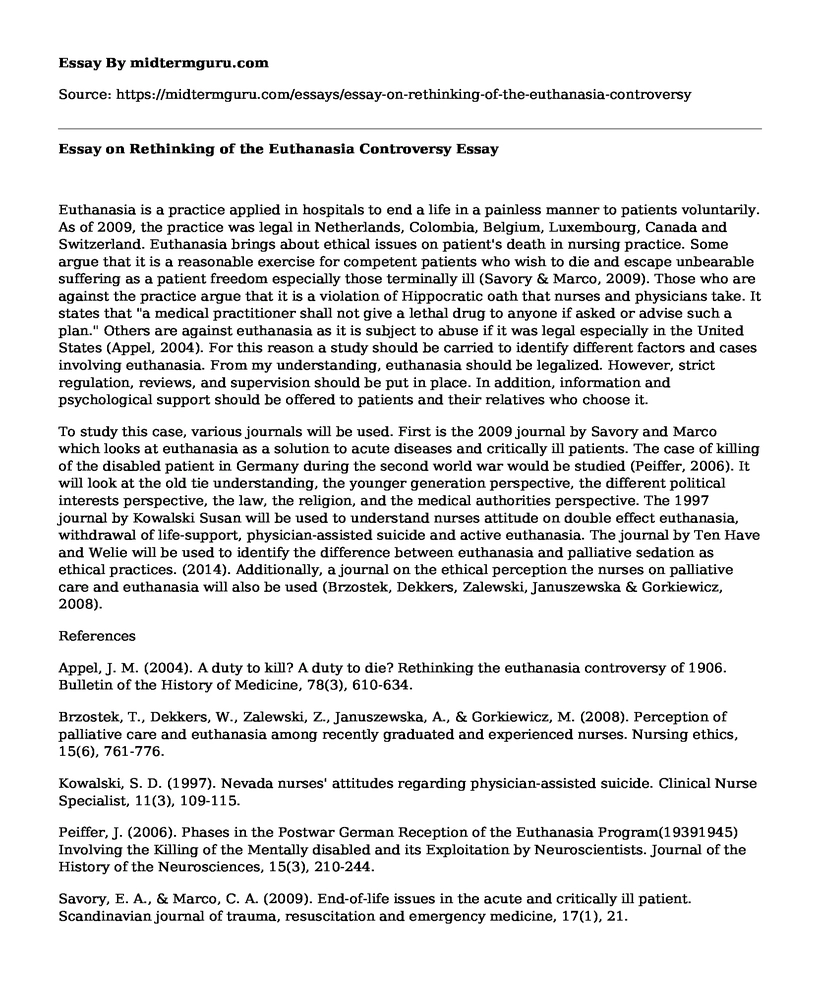Euthanasia is a practice applied in hospitals to end a life in a painless manner to patients voluntarily. As of 2009, the practice was legal in Netherlands, Colombia, Belgium, Luxembourg, Canada and Switzerland. Euthanasia brings about ethical issues on patient's death in nursing practice. Some argue that it is a reasonable exercise for competent patients who wish to die and escape unbearable suffering as a patient freedom especially those terminally ill (Savory & Marco, 2009). Those who are against the practice argue that it is a violation of Hippocratic oath that nurses and physicians take. It states that "a medical practitioner shall not give a lethal drug to anyone if asked or advise such a plan." Others are against euthanasia as it is subject to abuse if it was legal especially in the United States (Appel, 2004). For this reason a study should be carried to identify different factors and cases involving euthanasia. From my understanding, euthanasia should be legalized. However, strict regulation, reviews, and supervision should be put in place. In addition, information and psychological support should be offered to patients and their relatives who choose it.
To study this case, various journals will be used. First is the 2009 journal by Savory and Marco which looks at euthanasia as a solution to acute diseases and critically ill patients. The case of killing of the disabled patient in Germany during the second world war would be studied (Peiffer, 2006). It will look at the old tie understanding, the younger generation perspective, the different political interests perspective, the law, the religion, and the medical authorities perspective. The 1997 journal by Kowalski Susan will be used to understand nurses attitude on double effect euthanasia, withdrawal of life-support, physician-assisted suicide and active euthanasia. The journal by Ten Have and Welie will be used to identify the difference between euthanasia and palliative sedation as ethical practices. (2014). Additionally, a journal on the ethical perception the nurses on palliative care and euthanasia will also be used (Brzostek, Dekkers, Zalewski, Januszewska & Gorkiewicz, 2008).
References
Appel, J. M. (2004). A duty to kill? A duty to die? Rethinking the euthanasia controversy of 1906. Bulletin of the History of Medicine, 78(3), 610-634.
Brzostek, T., Dekkers, W., Zalewski, Z., Januszewska, A., & Gorkiewicz, M. (2008). Perception of palliative care and euthanasia among recently graduated and experienced nurses. Nursing ethics, 15(6), 761-776.
Kowalski, S. D. (1997). Nevada nurses' attitudes regarding physician-assisted suicide. Clinical Nurse Specialist, 11(3), 109-115.
Peiffer, J. (2006). Phases in the Postwar German Reception of the Euthanasia Program(19391945) Involving the Killing of the Mentally disabled and its Exploitation by Neuroscientists. Journal of the History of the Neurosciences, 15(3), 210-244.
Savory, E. A., & Marco, C. A. (2009). End-of-life issues in the acute and critically ill patient. Scandinavian journal of trauma, resuscitation and emergency medicine, 17(1), 21.
Ten Have, H., & Welie, J. V. (2014). Palliative sedation versus euthanasia: an ethical assessment. Journal of pain and symptom management, 47(1), 123-136.
Cite this page
Essay on Rethinking of the Euthanasia Controversy. (2021, Jun 02). Retrieved from https://midtermguru.com/essays/essay-on-rethinking-of-the-euthanasia-controversy
If you are the original author of this essay and no longer wish to have it published on the midtermguru.com website, please click below to request its removal:
- Connecticut Emergency Alerting and Notification Systems - Paper Example
- Paper Example on Pressure Ulcers
- Improving Nurses Practice to Reduce the Number of Falls in Male Rehabilitation
- Analysis of Cross-Cultural Leadership Practices - Essay Sample
- Drug Abuse: Societal Cost and Effects on Population - Essay Sample
- Asthma: A Global Health Threat Affecting 300 Million People - Research Paper
- Clinician's Unique Skill: Understanding Patient Goals & Prognosis - Essay Sample







